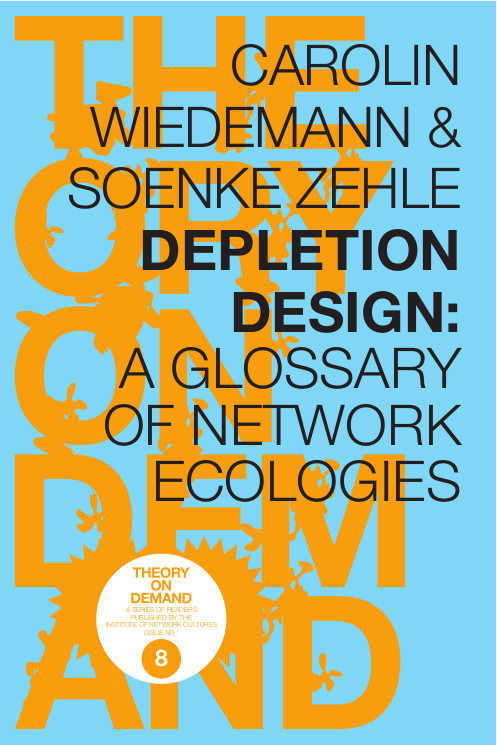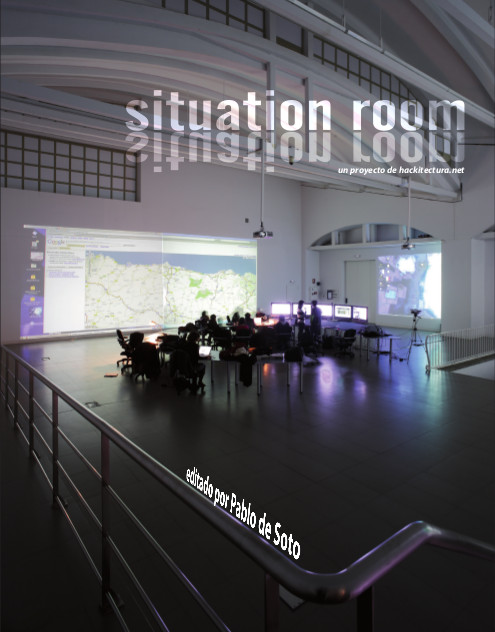Carolin Wiedemann, Soenke Zehle (eds.): Depletion Design: A Glossary of Network Ecologies (2012)
Filed under book | Tags: · algorithm, anonymous, architecture, biopolitics, commons, creative industries, cyborg, design, ecology, hackerspace, media ecology, network ecology, networks, politics, remix, software, spam, technology, theory

“Depletion Design suggests that ideas of exhaustion cut across cultural, environmentalist, and political idioms and offers ways to explore the emergence of new material assemblages. Soenke Zehle and Carolin Wiedemann discuss Depletion Design with Marie-Luise Angerer, Jennifer Gabrys and David M. Berry, inviting tm13 participants into a collaborative reflection on the necessity to understand human beings as one species among others – constituted by interactions of media, organisms, weather patterns, ecosystems, thought patterns, cities, discourses, fashions, populations, brains, markets, dance nights and bacterial exchanges (Angerer); on the material leftovers of electronics as provocations to think through and rework practices of material politics that may be less exploitative within our natural-cultural relationships (Gabrys); and on lines of flight from and through the computational – about expanding them into new ways of living beyond current limitations and towards new means of judgment and politics (Berry).
We, or so we are told, are running out of time, of time to develop alternatives to a new politics of emergency, as constant crisis has exhausted the means of a politics of representation too slow for the state of exception, too ignorant of the distribution of political agency, too focused on the governability of financial architectures. But new forms of individual and collective agency already emerge, as we learn to live, love, work within the horizon of depletion, to ask what it means to sustain ourselves, each other, again. Of these and other knowledges so created, there can no longer be an encyclopedia; a glossary, perhaps.”
Contributors: Marie-Luise Angerer (Cyborg), Franco ‘Bifo’ Berardi (Exhaustion, Soul Work), David M. Berry (On Terminality), Zach Blas (Queer Darkness), Drew S. Burk (Grey Ecology), Gabriella Coleman (Anonymous), Heidi Rae Cooley (Ecologies of Practice), Sebastian Deterding (Playful Technologies, Persuasive Design), Jennifer Gabrys (Natural History, Salvage), Johannes Grenzfurthner & Frank A. Schneider (Hackerspace), Eric Kluitenberg (Sustainable Immobility), Boyan Manchev (Disorganisation, Persistence), Lev Manovich (Software), Sonia Matos (Wicked Problems), Timothy Morton (Ecology without Nature), Jason W. Moore (Crisis), Anna Munster (Digital Embodiment), Eduardo Navas (Remix[ing] Re/Appropriations), Brett Neilson (Fracking), Sebastian Olma (Biopolitics, Creative Industries, Vitalism), Luciana Parisi (Algorithmic Architecture), Jussi Parikka (Dust Matter), Judith Revel (Common), Ned Rossiter (Dirt Research), Sean Smith (Information Bomb), Hito Steyerl (Spam of the Earth)
Publisher Institute of Network Cultures, Amsterdam, Dec 2012
Theory on Demand series, 8
Creative Commons Attribution-NonCommercial-ShareAlike 3.0 Netherlands License
ISBN 9789081857512
via jussiparikka.net
PDF, PDF (updated on 2015-7-9)
Comment (0)Ian Buchanan (ed.): Jameson on Jameson: Conversations on Cultural Marxism (2007)
Filed under book | Tags: · architecture, art, capitalism, cinema, cognition, ideology, literary theory, literature, marxism, modernism, philosophy, politics, postmodern, postmodernism, poststructuralism, psychoanalysis, urbanism, utopia

Fredric Jameson is one of the most influential literary and cultural critics writing today. He is a theoretical innovator whose ideas about the intersections of politics and culture have reshaped the critical landscape across the humanities and social sciences. Bringing together ten interviews conducted between 1982 and 2005, Jameson on Jameson is a compellingly candid introduction to his thought for those new to it, and a rich source of illumination and clarification for those seeking deeper understanding. Jameson discusses his intellectual and political preoccupations, most prominently his commitment to Marxism as a way of critiquing capitalism and the culture it has engendered. He explains many of his key concepts, including postmodernism, the dialectic, metacommentary, the political unconscious, the utopian, cognitive mapping, and spatialization.
Jameson on Jameson displays Jameson’s extraordinary grasp of contemporary culture—architecture, art, cinema, literature, philosophy, politics, psychoanalysis, and urban geography—as well as the challenge that the geographic reach of his thinking poses to the Eurocentricity of the West. Conducted by accomplished scholars from United States, Egypt, Korea, China, Sweden, and England, the interviews elicit Jameson’s reflections on the broad international significance of his ideas and their applicability and implications in different cultural and political contexts, including the present phase of globalization.
The volume includes an introduction by Jameson and a comprehensive bibliography of his publications in all languages.
Interviewers: Mona Abousenna, Abbas Al-Tonsi, Srinivas Aravamudan, Jonathan Culler, Sara Danius, Leonard Green, Sabry Hafez, Stuart Hall, Stefan Jonsson, Ranjana Khanna, Richard Klein, Horacio Machin, Paik Nak-chung, Michael Speaks, Anders Stephanson, Xudong Zhang
Publisher Duke University Press, 2007
Post-Contemporary Interventions series
ISBN 0822340879, 9780822340874
296 pages
Situation Room: Designing a Prototype of a Citizen Situation Room (2010) [English/Spanish]
Filed under book | Tags: · architecture, capitalism, cartography, cybernetics, military

The term Situation Room is normally used to designate a secret place used in times of crisis to assess and monitor data for decision making purposes. Its origins can be traced back to World War II with the invention of computers, digitalization, and the collaboration of architects and the military. These rooms are equipped with monitors and data boards used to control everything from flows crossing the strait of Gibraltar to nuclear fission processes in Nuclear Power plants and the life support mechanisms on board the International Space Station.
“Rather than being afraid of control, and technologies in general, we prefer to think in terms of social appropriation and implementation with research and creativity; we even think that, as Cybersyn shows, the source of technological creativity actually lies in social cooperation, and that it is only later captured by the military or capitalism.” -Hackitectura
Idea: José Pérez de Lama y Pablo de Soto
Editors Pablo de Soto & Hackitectura
Publisher dpr-barcelona, June 2010
Creative Commons Attribution-NonCommercial-ShareAlike 3.0 License
ISBN 9788461415045
112 pages

